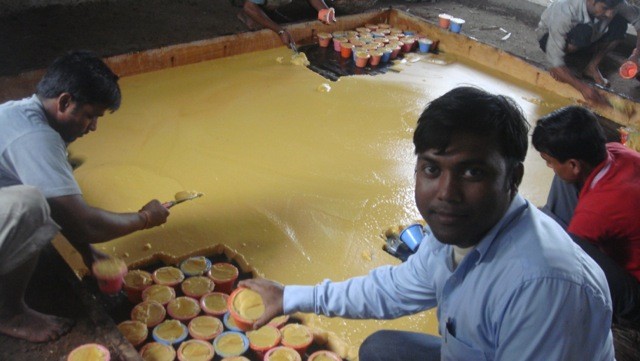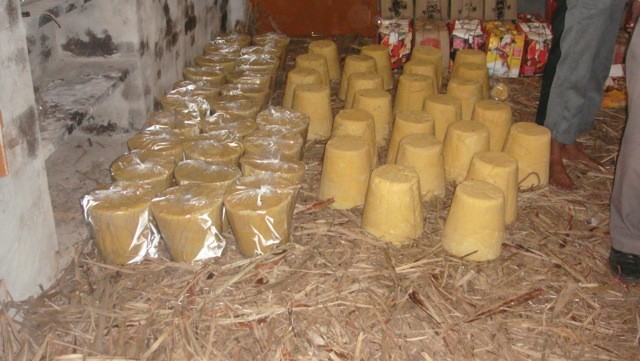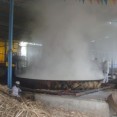The project aims to demonstrate the integration of thermal biomass gasifiers (efficiency > 70%) in the jaggery units for heating, with the aim of making the production process more energy efficient and user friendly, as well as improving the working environment and the quality of the produce.
 The project involves showcasing a biomass gasifier-based demonstration model for jaggery production in the rural jaggery industry in the village of Gokak in rural Karnataka, India. Jaggery is unrefined whole cane sugar prepared by solidifying the sugar cane juice after heating (to 200°C) and is used in a variety of sweet preparations and catering. India accounts for more than 70% of the global jaggery production and in rural Karnataka there are around 7000 jaggery production units.
The project involves showcasing a biomass gasifier-based demonstration model for jaggery production in the rural jaggery industry in the village of Gokak in rural Karnataka, India. Jaggery is unrefined whole cane sugar prepared by solidifying the sugar cane juice after heating (to 200°C) and is used in a variety of sweet preparations and catering. India accounts for more than 70% of the global jaggery production and in rural Karnataka there are around 7000 jaggery production units.
 However, these jaggery units are facing certain challenges, mainly due to the ongoing traditional use of conventional bagasse combustion systems. This traditional heating practice is very inefficient (<30%) and the bagasse obtained after cane crushing (30% moisture) is insufficient. As a result, the gap is filled by burning used automobiles tyres which causes a lot of pollution, makes the working environment unhygienic and increases production costs. In addition to the environmentally harmful and unhealthy combustion, the working conditions are quite arduous and people are increasingly reluctant to work in the industry.
However, these jaggery units are facing certain challenges, mainly due to the ongoing traditional use of conventional bagasse combustion systems. This traditional heating practice is very inefficient (<30%) and the bagasse obtained after cane crushing (30% moisture) is insufficient. As a result, the gap is filled by burning used automobiles tyres which causes a lot of pollution, makes the working environment unhygienic and increases production costs. In addition to the environmentally harmful and unhealthy combustion, the working conditions are quite arduous and people are increasingly reluctant to work in the industry.
 The project aims to demonstrate the integration of thermal biomass gasifiers (efficiency > 70%) in the jaggery units for heating, with the aim of making the production process more energy efficient and user friendly, as well as improving the working environment and the quality of the produce.
The project envisages the implementation of three main aspects:
The project aims to demonstrate the integration of thermal biomass gasifiers (efficiency > 70%) in the jaggery units for heating, with the aim of making the production process more energy efficient and user friendly, as well as improving the working environment and the quality of the produce.
The project envisages the implementation of three main aspects:
- Formation of a Common Facility Centre (CFC) incorporating five small jaggery production units in the Belgaum district of Karnataka. The local partner Phoenix Products will purchase the bagasse from CFC members and provide them with bagasse pellets or wood to run the gasifier
- Demonstration and field testing of the thermal biomass gasifier (efficiency >70%), which will be owned and operated by the CFC
- Development of a business model and dissemination of learning to other jaggery producers. The latter will be done through a national body to foster the further upscaling and replication of the project.
Projects with same technology
Gasification based Electrification for Rural Livelihoods and Energy in Nepal
Gasification and Biodigestion to Improve Small & Medium Scale Colombian Coffee Farms
This project aims to implement a suite of three technologies: gasification-fuelled cookstoves, tubular plug-flow biodigesters and gasification-fuelled coffee dryers. Using a participative process, six of these demonstration suites will be implemented in five departments of Colombia: Santander (2), Meta, Antioquia, Cauca and Caldas.
Projects in same country
Energy enterprises for development in rural areas: the case of clean cooking fuel
To develop and operate a sustainable rural demonstration project: a community dairy biogas enterprise
Powering a village sustainably: generating electricity from waste-based biogas
To facilitate access to electricity in rural communities through community enterprises that generate electricity by using local sources.